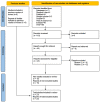The Association between ADHD and Celiac Disease in Children
- PMID: 35740718
- PMCID: PMC9221618
- DOI: 10.3390/children9060781
The Association between ADHD and Celiac Disease in Children
Abstract
Controversy around the association between celiac disease (CeD) and attention deficit hyperactive disorder (ADHD) was addressed by a systematic review in 2015, ultimately showing no association. Since 2015, there have been several studies showing an association between celiac disease and attention deficit hyperactive disorder. This is an updated systematic review.
Background: Most experts agree on the recommendation to not screen as part of the standard of care for ADHD in persons with CeD or vice versa. Simultaneously, they propose that untreated patients with CeD and neurological symptoms such as chronic fatigue, inattention, pain, and headache could be predisposed to ADHD-like behavior, namely inattention (which may be alleviated by following a gluten-free diet). The inattentive subtype of ADHD that encompasses the symptoms of inattention is phenotypically heterogeneous, as it includes the clinical construct of sluggish cognitive tempo (SCT). SCT symptoms overlap with the neurological manifestations of CeD.
Methods: A systematic search (PRISMA) of PubMed, Google Scholar, EMBASE, Web of Science, Stanford Lane, SCOPUS, and Ovid was conducted for articles up to 21 February 2022. Of these, 23 studies met the criteria.
Results: Out of the 23 studies, 13 showed a positive association between ADHD and CeD. Most studies that showed a positive association had been published in the last five years. Inconsistencies in the results remain due to the heterogeneous methodology used, specifically for ADHD and the outcome questionnaires, as well as a lack of reporting on ADHD subtypes.
Conclusion: There is an association between ADHD and celiac disease. The current methodological limitations will be lessened if we examine the subtypes of ADHD.
Keywords: ADHD; association; celiac disease; systematic review.
Conflict of interest statement
The author declares no conflict of interest.
Figures
Similar articles
-
Association of ADHD and Celiac Disease: What Is the Evidence? A Systematic Review of the Literature.J Atten Disord. 2020 Aug;24(10):1371-1376. doi: 10.1177/1087054715611493. Epub 2016 Jan 29. J Atten Disord. 2020. PMID: 26825336
-
Does Sluggish Cognitive Tempo Fit Within a Bi-Factor Model of ADHD?J Atten Disord. 2017 Jun;21(8):642-654. doi: 10.1177/1087054714539995. Epub 2014 Jul 8. J Atten Disord. 2017. PMID: 25005039 Free PMC article.
-
Evaluating the utility of sluggish cognitive tempo in discriminating among DSM-IV ADHD subtypes.J Abnorm Child Psychol. 2010 Feb;38(2):173-84. doi: 10.1007/s10802-009-9355-8. J Abnorm Child Psychol. 2010. PMID: 19731006
-
Sluggish Cognitive Tempo as a Possible Predictor of Methylphenidate Response in Children With ADHD: A Randomized Controlled Trial.J Clin Psychiatry. 2018 Mar/Apr;79(2):17m11553. doi: 10.4088/JCP.17m11553. J Clin Psychiatry. 2018. PMID: 29489078 Free PMC article. Clinical Trial.
-
Determination of gluten immunogenic peptides for the management of the treatment adherence of celiac disease: A systematic review.World J Gastroenterol. 2021 Oct 7;27(37):6306-6321. doi: 10.3748/wjg.v27.i37.6306. World J Gastroenterol. 2021. PMID: 34712034 Free PMC article.
Cited by
-
Is Histamine and Not Acetylcholine the Missing Link between ADHD and Allergies? Speer Allergic Tension Fatigue Syndrome Re-Visited.J Clin Med. 2023 Aug 17;12(16):5350. doi: 10.3390/jcm12165350. J Clin Med. 2023. PMID: 37629392 Free PMC article.
-
The impacts associated with having ADHD: an umbrella review.Front Psychiatry. 2024 May 21;15:1343314. doi: 10.3389/fpsyt.2024.1343314. eCollection 2024. Front Psychiatry. 2024. PMID: 38840946 Free PMC article. Review.
-
Psychiatric and Neurological Manifestations of Celiac Disease in Adults.Cureus. 2023 Mar 3;15(3):e35712. doi: 10.7759/cureus.35712. eCollection 2023 Mar. Cureus. 2023. PMID: 36875248 Free PMC article. Review.
-
Assessing the causal association between celiac disease and autism spectrum disorder: A two-sample Mendelian randomization approach.Autism Res. 2025 Jan;18(1):195-201. doi: 10.1002/aur.3257. Epub 2024 Nov 25. Autism Res. 2025. PMID: 39587862
-
Neurodevelopmental Disorders (NDDs): Beyond the Clinical Definition and Translational Approach.Children (Basel). 2023 Jan 3;10(1):99. doi: 10.3390/children10010099. Children (Basel). 2023. PMID: 36670649 Free PMC article.
References
Publication types
LinkOut - more resources
Full Text Sources
Miscellaneous


